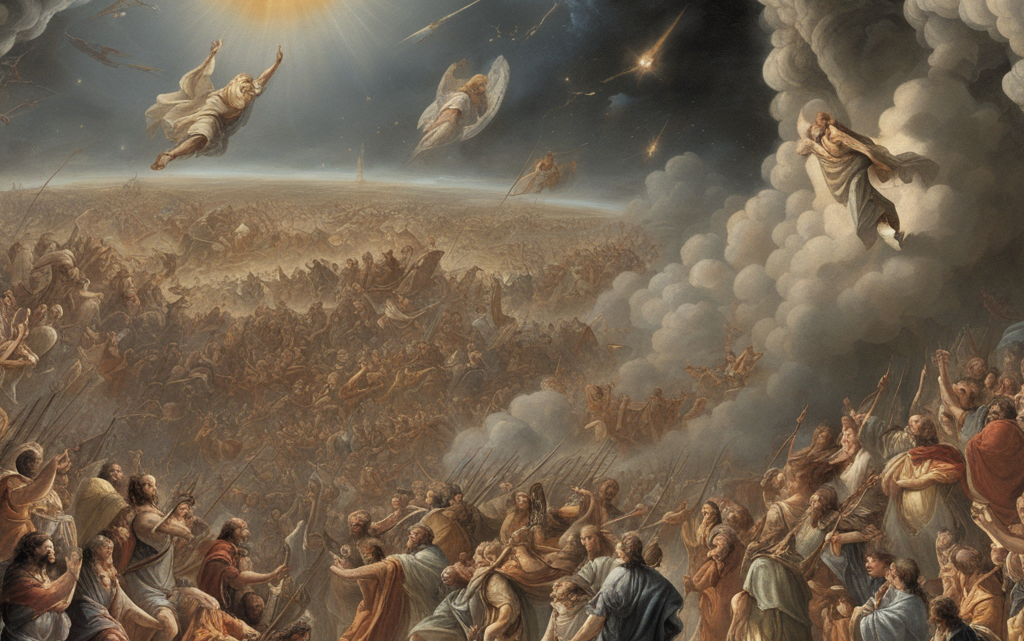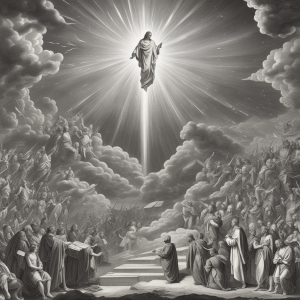The War in Heaven: A Past Event, Future Prophecy, or Both?


The concept of a “war in heaven” has captured the imagination of theologians, scholars, and laity alike for centuries. Yet, the question remains: Has this celestial conflict already occurred, or is it an event that humanity should brace for in the future? To tackle this enigma, we’ll examine the canonical Bible, as well as supplementary texts like the Dead Sea Scrolls and apocryphal books.
Canonical Scripture: The Christian Perspective
The New Testament, particularly the Book of Revelation, offers the most explicit account of a war in heaven. The Apostle John describes this celestial battle as follows:
“And there was war in heaven: Michael and his angels fought against the dragon; and the dragon fought and his angels, And prevailed not; neither was their place found any more in heaven. And the great dragon was cast out, that old serpent, called the Devil, and Satan, which deceiveth the whole world: he was cast out into the earth, and his angels were cast out with him.” (Revelation 12:7-9 KJV)
This passage clearly states that a war occurred in heaven, resulting in Satan and his angels being expelled. Many Christian theologians interpret this event as occurring in the distant past, possibly before the creation of humanity. Jesus’ words in Luke 10:18, “I beheld Satan as lightning fall from heaven,” further support the idea that this event already occurred.
Canonical Scripture: The Hebrew Perspective
Jewish texts offer less clarity on a war in heaven. While Isaiah 14:12-15 and Ezekiel 28:12-19 discuss the fall of a prideful being, often associated with Satan, these texts are not as explicit as the New Testament. The Hebrew Bible (Tanakh) doesn’t discuss a war in heaven per se but does mention spiritual warfare and celestial beings in texts like Daniel.
The Book of Job: A Temporal Anomaly?
Adding complexity to the timeline is the Book of Job, where Satan appears before God in a heavenly assembly (Job 1:6-7). This presents a theological dilemma: If the war in heaven resulted in Satan’s permanent expulsion, what was he doing in heaven during the time of Job? Various interpretations exist, ranging from viewing Job as allegory to proposing that Satan had limited, temporary access to heaven.
The Dead Sea Scrolls and The War Scroll
Among the Dead Sea Scrolls is a text known as the War Scroll (1QM), which outlines an apocalyptic battle between the “Sons of Light” and the “Sons of Darkness.” While this doesn’t describe a war in heaven, it has eschatological implications and introduces the idea of a future conflict involving celestial beings.
1 Enoch and the Watchers
The Book of Enoch, though not canonical, has had a significant influence on Christian eschatology. It describes the descent of a group of angels known as the Watchers who corrupt humanity. While it doesn’t describe a war in heaven, it portrays a divine judgment and the fall of these beings.
Interpretations and Conclusions
Given the range of perspectives and texts, three primary interpretations emerge:
- Past Event: The war in heaven is a past event, completed before the earthly life of Jesus, or even before the creation of humanity.
- Future Event: Some argue that the war in heaven will be part of future eschatological events, aligning with various prophecies in the Book of Revelation.
- Both Past and Future: A more nuanced view is that the war in heaven may have occurred in stages—some in the past, some yet to come.
The question of whether the war in heaven has already occurred or is yet to happen does not have a definitive answer based solely on canonical texts. When we include non-canonical texts, the picture gets even more complicated but also richer, introducing additional layers of meaning and interpretation.
References:
- The Bible, King James Version (Revelation 12:7-9, Luke 10:18, Job 1:6-7)
- The Hebrew Bible, Tanakh (Isaiah 14:12-15, Ezekiel 28:12-19)
- The Dead Sea Scrolls, The War Scroll (1QM)
- The Book of Enoch
Interpreting the war in heaven requires balancing textual evidence with theological understanding. Whether one sees it as a past event, a future prophecy, or a complex interplay of both, the concept undeniably continues to intrigue and challenge us, encouraging deeper exploration of our spiritual texts.

